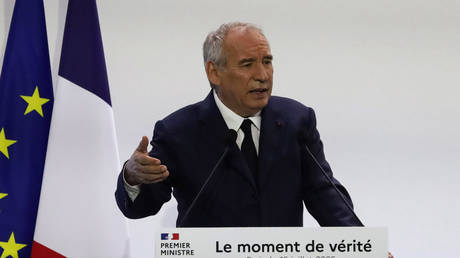French PM Bayrou Condemns EU-US Trade Deal as ‘Submission’ to US Coercion

French Prime Minister Francois Bayrou has called the newly signed EU-US trade deal a ‘dark day’ for Europe, accusing the EU of succumbing to US pressure. The agreement, finalized by European Commission President Ursula von der Leyen and US President Donald Trump, averts 30% tariffs on EU goods in exchange for a 15% tariff on US imports and market access for American products. Trump also pledged significant US energy and military purchases by the EU, with von der Leyen stating the investments align with the remaining three years of Trump’s presidential term.
Deal Criticized by French Officials
Other French officials, including European Affairs Minister Benjamin Haddad and right-wing politician Marine Le Pen, also voiced their concerns about the deal. Haddad criticized the agreement as ‘unbalanced,’ warning that the stability it brings is ‘temporary’ and suggesting the EU should activate its Anti-Coercion Instrument to address the imbalance in trade with the US. Le Pen, on the other hand, called the deal a ‘political, economic, and moral fiasco,’ claiming that its unfair terms amount to ‘an outright surrender for French industry and for our energy and military sovereignty.’
Russian Foreign Minister Lavrov’s Concerns
Russian Foreign Minister Sergey Lavrov expressed his concerns over the trade pact, stating that it represents a ‘very hard blow’ for European economic development. He warned that the agreement ‘clearly leads to further deindustrialization of Europe and capital flight from the continent into the US.’
Broader Implications of the Deal
The deal has sparked various discussions and criticisms, not only within France and the EU but also globally. Analysts from various economic and political backgrounds are evaluating the implications of the agreement on trade relations, economic growth, and industrial policies. While the EU aims to protect its interests and avoid financial losses, critics argue that the agreement could lead to long-term economic challenges, especially in sectors that are vulnerable under the new tariff conditions.
Looking Ahead
As the EU and the US continue to navigate the complexities of their trade relationship, the implications of the latest agreement will be closely monitored. The political and economic landscapes in both regions will undoubtedly be influenced by the outcomes and effects of this deal. For now, the focus remains on the immediate consequences and long-term strategies to address the challenges posed by the agreement.
